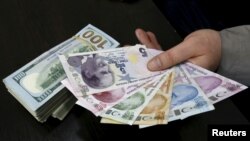Turkish financial markets are among the worst hit in the face of its Greek neighbor's troubles and the Turkish lira has hit record lows. The impact is seen as a sign of growing vulnerability in the Turkish economy, which is already under pressure from rising border concerns with Syria, and efforts to form a coalition government.
The fear of growing financial problems is compounded by the fight against Islamic State and instability in neighboring Syria.
Visiting scholar Sinan Ulgen, of the Brussels based Carnegie Institute, says Sunday's referendum in Greece is adding to financial pressure on Turkey, which is not a member of the eurozone.
"There are certainly substantive risks for Turkey given that both the security situation in region. But also the vote this weekend in Greece means that there is going to be a degree of turbulence in the financial markets," said Ulgen.
Underlying economic weakness
The vulnerability of Turkish financial markets to its neighbor’s woes is being seen as sign of underlying economic weakness.
Istanbul-based consultant for Global Source Partners, Atilla Yesilada, says Turkey is facing major economic challenges.
"Growth has decelerated from seven percent to three percent. [Turkey's] current account deficit is still at five percent, which is among the highest in emerging nations, and we have eight percent inflation, also among the highest in large emerging nations," he said.
Turkey’s biggest foreign currency earner, tourism, is also struggling. Fewer Russians are visiting because of sanctions on their country and the number of Europeans visiting Mediterranean beaches is expected to be down following the terror attack at a Tunisian resort.
Political concerns
Analyst Yesilada warns the difficulty in forming a coalition government after June's election could add to the problem, especially if early elections are called.
"In that case Turkey will be without a functioning government until late summer, possibly early fall, by which time I suspect the Fed will be raising interest rates and the entire emerging markets environment will be hit by successive shocks," said Yesilada.
The U.S. Federal Reserve Bank policy of lending money at near zero interest rates has particularly benefited the Turkish economy, which relies heavily on international capital. With the policy’s expected end, coinciding with a deepening financial chaos in Greece and civil war in Syria, along with the threat of another election, financial observers warn Turkey could soon face a perfect storm with damaging results.




